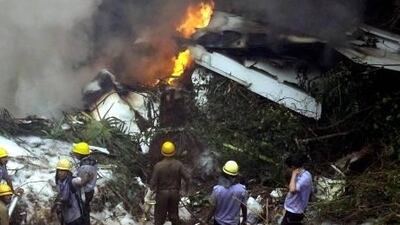DUBAI // A year after an Air India Express flight crashed outside Mangalore, claiming the lives of 158 passengers and crew, many of the victims' families are still waiting for compensation.
Only eight passengers survived when Flight 812 from Dubai overshot the runway and crashed while landing at Mangalore on May 22 last year.
"About 50 families have received compensation from the insurance companies, but many families have not even been contacted," Rafik Eroth, the crash victims' support group organiser in Dubai, said.
He accused insurance representatives of "playing foul" over the payouts.
The Mangalore air crash was India's third-deadliest, after the 1996 Charkhi Dadri mid-air collision, which killed 349, and the 1978 crash of Air India Flight 855, which claimed the lives of 213 passengers and crew.
Investigators blamed pilot error for the Mangalore crash, claiming that Captain Zlatko Glušica, 55, had slept for more than 90 minutes during the flight. Glušica, a British and Serbian national, had more than 10,000 hours of flying and 7,500 hours of command experience.
After five months of investigations, the court of inquiry submitted its findings on November 16 last year. It blamed the crash on an incorrect flight path.
The Indian prime minister, Manmohan Singh, announced after the inquiry that $4,440 (Dh16,309) would be paid to families of the victims, with $1,110 for the injured to be allocated from the Prime Minister's National Relief Fund.
The Karnataka chief minister, Yeddy Urappa, also announced additional compensation of $4,440 to each of the victim's families.
The Civil Aviation Ministry ordered the airline to provide up to $159,840 to families of the victims in line with the Indian Carriage by Air Act, which follows the Montreal Convention.
"The convention constitutes a $135,000 payment to each of the victim's families," Mr Eroth said. "But all received varying amounts from Air India.
"The insurance representatives have been playing foul and not presenting legitimate compensations."
Mr Eroth said that some families had received compensation far above what the Montreal Convention required while others had received considerably less.
"Some families received $150,000 to $200,000 while others received much less," he said.
Last year Air India announced an additional interim compensation of $22,200 for passengers above 12 years of age and $11,100 for passengers below 12 years of age along with $4,440 for injured passengers.
As of June 11 last year $4 million has been announced for distribution as compensation to the families of the victims and to the eight survivors.
However, Mr Eroth maintained that some families had not even been contacted by the airline.
"Many families have lost their breadwinners and face major financial difficulties," he said. "I believe [the insurance companies] are delaying the process to pass the two-year mark so that the families lose their claims."
Families of crash victims had a two-year period in which to apply for compensation, Mr Eroth said.

